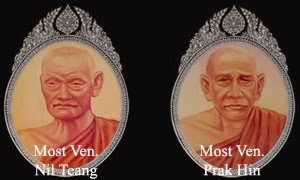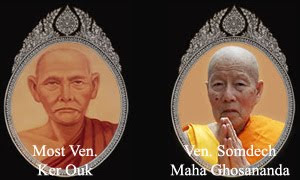April 14, 2010
Symbols in Buddhism
Ten Birth Stories of Buddha
Temiraja Jataka

There once lived a king Kasiraja of Benares who had neither son nor daughter. His chief queen, Candadevi, known for virtues, asked the great god Sakka for a son which was later named Temiya-Kumara. When Temiya was one month old, he was brought to the throne of his father to sit on his knee. Four robbers were then brought before the king to be judged. Temiya witnessed his father sentence one robber to a thousand strokes from thorn-baited whips, another to imprisonment in chains, the third to death by the spear and the fourth to death by impaling.
Buddhism in Cambodia

In the year 238 B.C Emperor Asoka King had sent two lear ned Bhikkus namely Sona Thera and Utara Thera to propagate Buddhism in Suwanaphumi or Southeast Asia in present time. From that time Buddhism has flourished through out the land of Suwanaphumi, especially we could note the main events in various ancient kingdom i.e.Funan Kingdom(first state of present Cambodia) has been claimed about the advantage of Buddhism in this capital city. Among the kings of Funan dynasty, Kaundinya Jayavarman (478-514 AD) sent a mission to China under the leadership of a Buddhist monk named Nagasena from India.
Three Meritorious Deeds
The way of general lay people’s living, that is the pure body, words, and mind that reveal one’s proper mind state following the pattern of systematic consideration. The stable mind will lead the person to firmly perform his conduct under the three basics of meritorious deeds or the ground for accomplishing merit. Those are:
Principles of Success
April 12, 2010
My Ordination as a Novice
At the age of eighteen, upon completion of my High School, I decided to join novicehood. When I was at school, I took great interest in Buddhism lessons. It had been my long wish to devote myself to the study of Dhamma and the Pali language under the tutelage of some senior monks. The only way to fulfill my desire was by joining the Order, and so I made the volitional decision to get ordained. My parents who had always shown unfaltering faith in Buddhism, took utmost delight in my decision.
My life as a monk
My monastic life began as a novice at the age of eighteen. Later when I reached the age of twenty, I was ordained as a monk. My life as monk is a spiritual quest, freed from worldly burdens and clinging. I embarked upon this life to wage a war against all defilement. My novicehood was in a way a preparation for the hardship and challenges that lay ahead in the life of a monk. In the spiritual quest that I am striving to lead, the numerous conflicts that arise are always internal and the battlefield is my own self or mind. I have realized time and again the opponents in this spiritual war was parts of my own mind and the victory or defeat is dependent solely on my own effort.
The Life of The Buddha

Buddha’s Birth
The Buddha was born as Siddhatta on the day of the full moon in the month of Visakha in 623 B.C.E., in Lumbini Park at Kapilavatthu, a place where Indian borders of present Nepal. His father was King Suddhodana, a virtuous king of the Sakya dynasty, and his mother was Queen Maha Maya. His mother passed away seven days after his birth and from then on, Maha Pajāpati Gotami took care of Siddhatta. ‘Siddhatta’ means ‘one whose aim is accomplished’.
Qualities of a Good Person
A good person, or an ideal human being, is a valuable asset to society. Such a person is an exemplary member of the human race and is able to bring peace and prosperity to his society. According to Buddhism, there are seven qualities of a good person.
Economics in Buddhism
Money is given too much importance in today’s world. During the earlier times, there was no money and people lived with whatever was available to them. Later on they started to store the rice and so forth and quarreled with one another and thereby conflict started. At present, science and technology have improved so much and people’s needs have also increased. This causes lots of complications in society.
Principle of Success
Iddhipāda 4 (principles of success) are the principles that lead to success; Chanda, Viriya, Citta and Vimamsā.
1. Chanda: having a heart of zeal; to be keen to do something, and to it for the love of it; to wish to bring an activity or task to its optimum fruition, not simply doing it to get it out of the way or merely for reward or material gain.
Four Principles of Service
In order to have a harmonious relationship among the members of society, each member should practice certain principles regarding the services that are to be rendered to others. Buddhism has introduced the ‘principle of service’ (Sangaha-vatthu) aiming at rendering service to others.
Four Devine Abiding
Brahmavihāra refers to Dhamma of Brahma. Brahmavihāra is the principle for all people; gloriously and purely leading the life;
1. Mettā: loving-kindness; goodwill, the wish to help all people attain benefit and happiness. Happiness happens by body and mind e.g., the happiness of possessing wealth, the happiness of spending wealth, the happiness of freedom from debt, and the happiness of blameless conduct etc.
Components of Five Precepts
1. Not Killing
1.1 The victim must really be alive.
1.2 We are aware of that the victim is alive.
1.3 We have the intention to kill the victim.
1.4 We put in the effort to kill the victim.
1.5 The victim dies in the way intended.
Five Moral Precepts
Human beings have achieved great material progress due to the development of science and technology. When our material comfort level increased, there arose the desire to be free from conflict, ill-feeling, selfishness, deceit and strife. The five precepts are called ‘Panca-sila’ in Pali language. These precepts are the stepping stone to the ultimate aim of ‘Nibbana’. The five precepts are as follows:
1. Abstention from taking of life: According to the five precepts, Buddhists should not kill any living beings.
Three Admonitions
Avoid All Evil
‘Avoid all evil’ refers to the mindfulness of one’s physical, verbal and mental action within the frame of morality, which will affect the person and society as a whole. The mindfulness of one’s conduct is to be observed under the principle of Self-Training. The first principle is Training in Higher Morality which comprises Right Speech, Right Action and Right Livelihood.
Right Speech refers to good conduct in words, that is, abstaining from using false speech, tale bearing or malicious speech, harsh speech, and vain talk or gossip.
Right Action refers to wholesome courses of actions.
The Triple Gem
Triple Gem is the collective term for the Buddha, Dhamma and Sangha.
1. The Buddha
The one, who is self-enlightened, has realized the Noble Truths. He is the founder of the unexcelled Buddhism, being perfect in the threefold virtue as follows:
1.1 The Virtue of Wisdom: This implies His Enlightenment through His own efforts, which means the supreme knowledge of all things as they really are. Such Knowledge of his is unchangeable and timeless.

























